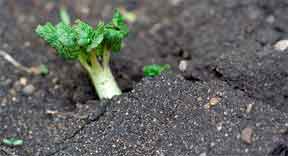It is nice we are starting our gardens together. It is early enough that we can plan some things we are going to do, or would like to do and possibly some that we should not do. In the Midwest where the corn grows tall and the summer nights, as well as days, are hot, gardens and plants must be those that can stand the heat that makes the corn grow. Even though you may think that you live in the world’s worst climate for gardening, so does everyone else no matter where they live.
Having a considerably longer growing season than many places, allow you to start earlier in the spring and carry on later in the fall. This is to your advantage. Actually anyone can have a nice garden if they try, even those who claim pitifully to say “I do not have a green thumb.”

To say you don’t have a green thumb is merely acknowledging that you do not bother to take care of your plants, that you think they should grow just because you planted them.
Start With the Soil
It is very seldom that the soil in any garden can be used as it is unless you have a deep, prairie soil such as a friend once had in Iowa. All the rest of us have to doctor up the soil. This usually means adding organic matter such as peat moss, compost, some fertilizer among other jobs to make the soil rich for plants both vegetables, flowers or other landscape material. There are very few soils that will not respond to this treatment.
Practically all soils need fertilization. Although many gardeners almost brag of the fact that they never fertilize their gardens, they could have much better gardens if they did. And for this there is still nothing any better, any more practical, or less expensive, than ordinary complete commercial fertilizer.
You must to be careful not to be taken in by some of the high powered advertising you hear and read about the alleged super fertilizers that are so powerful they are almost dangerous to use.
Every time you have a wet spring, or even more rare, a wet summer, many of us realize the need for better drainage in our gardens. Even hillside gardens may be poorly drained, the installation of lines of drain pipes just as on farms, will often increase plant growth and reduce the losses, particularly of roses, hardy perennials and evergreens, many times.
This is a good time of the year to start planning on such drainage even though we have to wait until the ground thaws to put it in.
